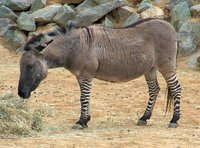Hybrid
|
|
- This article is about a biological term. See hybrid (disambiguation) for other meanings.
In biology, hybrid has three meanings.
- The first meaning is either the offspring of two different species, or of two different genera.
- The second meaning of "hybrid" is crosses between populations or cultivars ("cultivated varieties") of a single species. This second meaning is often used in plant breeding.
- Hybrids between species of the same genus are sometimes known as interspecific hybrids or crosses.
- Hybrids between different genera are sometimes known as intergeneric hybrids.
- Animal hybrids are commonly known as crossbreeds or crossbreds.
- The third meaning is in molecular biology, see Hybridisation (molecular biology).
Ernst Mayr wrote of Gregor Mendel, "He was uncertain about the nature of the kinds of peas he crossed, and, like most plant breeders, he called heterozygotes "hybrids". When he tried to confirm the laws he had found by using "other hybrids" that were actually real species hybrids, he failed. The use of the same term "hybrid" for two entirely different biological phenomena thwarted his later efforts." (This is Biology, 1997, p58f).
Some dog hybrids (used in sense two, above), are becoming increasingly popular and are being bred selectively.
Plant hybrids, especially,are often stronger than either parent variety, a phenomenon which when present is known as hybrid vigour. Plant breeders make use of a number of techniques to produce hybrids.
Interspecific hybrids
Interspecific hybrids are bred by mating two species, normally from within the same genus. The offspring display traits characterisitc of both parents. The offspring of an interspecific cross may be sterile. Sterility is attributed to the different number of chromosomes the two species have, for example donkeys have 62 chromosomes, while horses have 64, mules have 63. Mules and other sterile interspecific hybrids cannot produce viable gametes because the extra chromosome cannot make a homologous pair at meiosis, meiosis is disrupted and viable sperm and eggs are not formed.
Hybrids are often named by the portmanteu method, combining the names of the two parent species. For example, a zeedonk is a cross between a zebra and a donkey. Since the traits of hybrid offspring often vary depending on which species was mother and which was father, it is traditional to use the father's species as the first half of the portmanteau. For example, a liger is a cross between a male lion and a female tiger, while a tigon is a cross between a male tiger and a female lion.
Some animal interspecies hybrids are:
- Mule, a cross of female horse and a male donkey.
- Hinny, a cross between a female donkey and a male horse.
- Zeedonk, a zebra/donkey cross.
- Zorse or zebroid, a zebra/horse cross
- Dzo or zo: a cross between a domestic cow/bull and a yak.
- Beefalo, a cross of an American Bison and a domestic cow. This is a fertile breed, although the two species are in different genera (Bison and Bos, respectively).
- Hybrids between sheep and goat.
- Wolfdog, the cross between a domestic dog and a Wolf. Crosses also occur between coyote, wolves, dingos, and domestic dogs. Many of these produce fertile animals ("dog" & "wolf" are now usually considered the same species, so this may be considered a non-hybrid).
- Hybrids between spotted owls and barred owls
- Liger (or Tigon, depending on the parents' genders), a cross between a Lion and a Tiger. Various other wild cat crosses are known involving the Lynx, Bobcat, Leopard, Serval, etc.
- Congolese Spotted Lion
- Cama, a cross between a Camel and a Llama, also an intergeneric hybrid.
- Wolphin, a fertile but very rare cross between a False Killer Whale and a Bottlenose Dolphin.
- A fertile cross between an albino King Snake and an albino Corn Snake.
- At Chester Zoo in England, a cross between African elephant (male) and Indian elephant (female). The calf was named Motty. It died of gut infection after a few days.
- Cagebird breeders sometimes make hybrids between species of finch, such as goldfinch x canary.
Some plant hybrids include:
- Leyland Cypress, a hybrid between Monterey Cypress and Nootka Cypress.
- Loganberry, a hybrid between raspberry and blackberry.
- London Plane, a hybrid between Oriental Plane and American Plane (American Sycamore).
- Tangelo, a hybrid of a mandarin orange and a pummelo or a grapefruit which may have been developed in Asia about 3,500 years ago.
- Triticale, a wheat-rye hybrid.
Hybrids should not be confused with chimaeras.
Mythological and legendary hybrids
In ancient and modern local folktales, there exist hybrids resulting from the union between a human parent and an animal or a non-human sentient being. Some of these hybrids are crosses with humans and: brownies, nymphs, gods, Moo-Moo (Solomon Island Giant), chimpanzees (Humanzee), aliens, bats (Batboy), snakes/lizards (Naga, Syrictae), dropa, giants, cat people, mermaids, fairies, watchers, demons, dryads, spirits, incubus, succubus, pech, triton, larvae, martes, and others. One example is the Minotaur.da:Krydsning de:Hybrid fr:Hybride pl:Hybryda (biologia)

